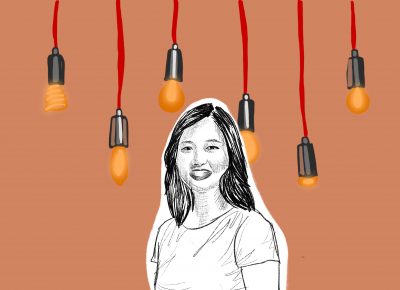Disclaimer: The city editor, Isabella Abraham, and city editorial staff did not have a role in the content, writing or editing of this editorial to maintain objectivity in Mayoral reporting.
Big ideas — for all their praise in Ted Talks — are not well-liked in American politics. Often, when you see a candidate campaign for a substantial political position with plans to significantly restructure existing systems or departments, the media and the public predictably dismiss these proposed changes simply because their outcome isn’t immediately visible, and thus, seems intangible.
These are the sorts of criticisms often leveled at Boston mayoral candidate — and front runner — Michelle Wu.

But these big ideas are what make change truly feasible, and for this reason, The Daily Free Press editorial board is proud to endorse Michelle Wu as Boston Mayor.
Our endorsement hinges on three main points: her vision for a better Boston, her stance on police reform and her strong commitment to climate change reform.
It is reasonable to demand plans and action steps from our politicians. Big promises for change without clear methods to get there are meaningless. But to discredit Wu simply for her big ideas is irrational.
The position of Boston mayor has usually been held by one person for decades. Mayor Thomas Menino alone served for more than 20 years. If Wu were to win, she’d be able to have the time and space to enact her big ideas.
Moreover, Wu’s track record as city councilor speaks for itself. She successfully spearheaded the campaign to pass laws regulating short-term rental companies like Airbnb, which some blame for increasing rents and gentrification. She pioneered paid parental leave laws in her first term and pushed for laws limiting law enforcement’s access to facial recognition technology throughout the city.
Wu has known what she wanted for a very long time. She knew what she wanted before a lot of young people knew what they wanted from politics.
This is not to say that every single one of Wu’s endeavors was successful. Moreover, other City councilors have noted Essaibi George seems to have a greater presence at community meetings regarding the opioid epidemic at the Massachusetts Avenue and Melnea Cass Boulevard area.
But Wu’s big-picture plan for Boston may be exactly what we need right now. The Summer 2020 protests against police brutality and racial inequality, as well as the pandemic, have shown us with vivid and horrific clarity how broken many of the social welfare systems are in this country.
Now that we are on relatively more stable ground, there is a real opportunity to address the systemic and structural roots of rampant inequality. Stability should not mean silence on these issues, and we need an advocate in office we can count on to push them through even when they don’t dominate the news.
These issues cannot be solved in small quick fixes that maintain the status quo. Their solutions require seeing the bigger picture.
For instance, take how some of Wu’s proposed plans of action converge to address the issue of homelessness. Wu believes in redirecting some police funds toward creating a crisis team of social workers and mental health clinicians to respond to nonviolent 911 calls involving homelessness, mental health, and substance abuse. She believes in implementing rent control to protect Boston residents from displacement due to rent hikes and amending Boston’s city zoning codes to prevent racial discrimination in the housing market.
Together, these plans all address the core of poverty and homelessness, without relying on criminalization or quick fixes.
Michelle Wu’s stance on police reform in contrast to Annissa Essaibi George is another point in her favor. Out of the initial six candidates for Boston mayor, Essaibi George stood out as one of the only candidates who did not support reducing police funding. One of Essaibi George’s plans involves hiring more police officers of color to diversify the force, despite research showing that a more diverse police force does not solve the issue of widespread and systematic police brutality against civilians.
Essaibi George expressed the need for greater police presence in the area to apprehend drug dealers. This proposed solution pretends the issue of homelessness and addiction can be solved through arrests, which research has shown only makes the issue worse.
Our third point of support for Wu is her seriousness when it comes to addressing climate change. Essaibi George said climate change was not a top priority for her, framing it in an interview with Boston.com as an issue led by “wealthy white suburbanites,” despite evidence showing the brunt of climate change affects low-income communities of color.
Wu stressed the importance of this issue in her action plan.
Among utilizing zoning laws and taxation to protect the environment as part of her Green New Deal, Wu also addresses more immediate steps towards addressing climate change. Her plan to make the MBTA free is a solution to make greener forms of public transportation accessible to all, regardless of income.
None of the above reasons are to claim that Wu is perfect. Her police reform plan could be expanded to include movement towards abolition, and she should be more vocal and present about how she plans to address the opioid crisis on Mass and Cass.
But no candidate is perfect. We, as a paper, endorse Michelle Wu because we believe in her vision, and we trust in her to be able to achieve it.
If there was ever a time for big ideas, it’s now.

















































































































